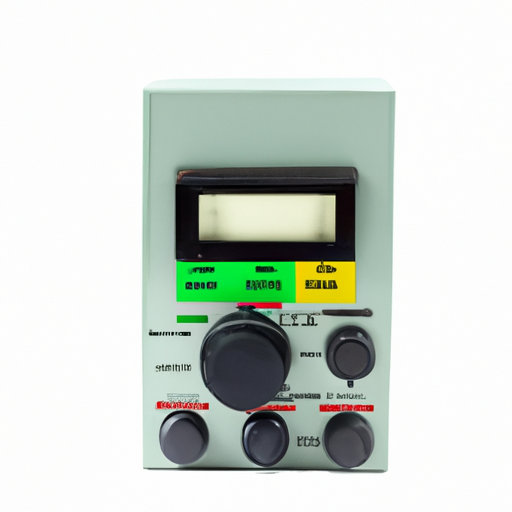

Title: Exploring the Diverse Product Types of Power Controllers

1. Solid-State Relays (200 words) Solid-state relays (SSRs) are one of the most common types of power controllers. These devices use semiconductor switching elements, such as thyristors or triacs, to control the flow of electrical power. SSRs offer numerous advantages over traditional electromechanical relays, including faster switching speeds, longer lifespan, and reduced noise. They are widely used in applications that require precise control, such as heating systems, motor drives, and lighting control.
2. Variable Frequency Drives (VFDs) (200 words) Variable frequency drives, also known as adjustable speed drives, are power controllers specifically designed for controlling the speed and torque of electric motors. VFDs convert fixed-frequency AC power into variable-frequency power, allowing for precise motor speed control. These devices find extensive use in industrial applications, such as pumps, fans, and conveyor systems, where energy efficiency and motor control are critical.
3. Programmable Logic Controllers (PLCs) (200 words) Programmable logic controllers are versatile power controllers widely used in industrial automation. PLCs are essentially small computers that can be programmed to control and monitor various processes and equipment. They provide a flexible and scalable solution for managing complex control systems, integrating multiple inputs and outputs, and executing logic-based operations. PLCs are commonly employed in manufacturing plants, power distribution systems, and building automation.
4. Power Distribution Units (PDUs) (200 words) Power distribution units are essential components in data centers and server rooms. These power controllers provide a centralized and organized approach to distributing electrical power to multiple devices. PDUs typically feature multiple outlets, surge protection, and monitoring capabilities. They ensure efficient power management, prevent overloads, and enable remote monitoring and control of power consumption. PDUs come in various configurations, including basic, metered, switched, and intelligent PDUs, catering to different power distribution requirements.
5. Uninterruptible Power Supplies (UPS) (200 words) Uninterruptible power supplies are critical power controllers that provide backup power during electrical outages or fluctuations. UPS systems consist of batteries, inverters, and charging circuits, ensuring a seamless transition from the main power source to the backup power supply. They protect sensitive equipment, such as computers, servers, and medical devices, from power disruptions, preventing data loss and equipment damage. UPS systems are available in different capacities, ranging from small desktop units to large-scale systems for data centers.
Conclusion (100 words) Power controllers encompass a wide range of products, each designed to fulfill specific power management requirements. From solid-state relays and variable frequency drives to programmable logic controllers, power distribution units, and uninterruptible power supplies, these devices offer diverse functionalities and applications. Understanding the different product types of power controllers empowers consumers and businesses to make informed decisions when it comes to selecting the most suitable device for their specific needs. By harnessing the power of these controllers, efficient power management and protection can be achieved across various industries and applications.
Title: Exploring the Diverse Product Types of Power Controllers

1. Solid-State Relays (200 words) Solid-state relays (SSRs) are one of the most common types of power controllers. These devices use semiconductor switching elements, such as thyristors or triacs, to control the flow of electrical power. SSRs offer numerous advantages over traditional electromechanical relays, including faster switching speeds, longer lifespan, and reduced noise. They are widely used in applications that require precise control, such as heating systems, motor drives, and lighting control.
2. Variable Frequency Drives (VFDs) (200 words) Variable frequency drives, also known as adjustable speed drives, are power controllers specifically designed for controlling the speed and torque of electric motors. VFDs convert fixed-frequency AC power into variable-frequency power, allowing for precise motor speed control. These devices find extensive use in industrial applications, such as pumps, fans, and conveyor systems, where energy efficiency and motor control are critical.
3. Programmable Logic Controllers (PLCs) (200 words) Programmable logic controllers are versatile power controllers widely used in industrial automation. PLCs are essentially small computers that can be programmed to control and monitor various processes and equipment. They provide a flexible and scalable solution for managing complex control systems, integrating multiple inputs and outputs, and executing logic-based operations. PLCs are commonly employed in manufacturing plants, power distribution systems, and building automation.
4. Power Distribution Units (PDUs) (200 words) Power distribution units are essential components in data centers and server rooms. These power controllers provide a centralized and organized approach to distributing electrical power to multiple devices. PDUs typically feature multiple outlets, surge protection, and monitoring capabilities. They ensure efficient power management, prevent overloads, and enable remote monitoring and control of power consumption. PDUs come in various configurations, including basic, metered, switched, and intelligent PDUs, catering to different power distribution requirements.
5. Uninterruptible Power Supplies (UPS) (200 words) Uninterruptible power supplies are critical power controllers that provide backup power during electrical outages or fluctuations. UPS systems consist of batteries, inverters, and charging circuits, ensuring a seamless transition from the main power source to the backup power supply. They protect sensitive equipment, such as computers, servers, and medical devices, from power disruptions, preventing data loss and equipment damage. UPS systems are available in different capacities, ranging from small desktop units to large-scale systems for data centers.
Conclusion (100 words) Power controllers encompass a wide range of products, each designed to fulfill specific power management requirements. From solid-state relays and variable frequency drives to programmable logic controllers, power distribution units, and uninterruptible power supplies, these devices offer diverse functionalities and applications. Understanding the different product types of power controllers empowers consumers and businesses to make informed decisions when it comes to selecting the most suitable device for their specific needs. By harnessing the power of these controllers, efficient power management and protection can be achieved across various industries and applications.